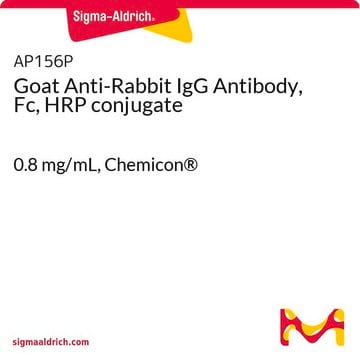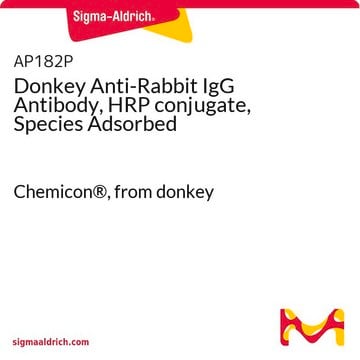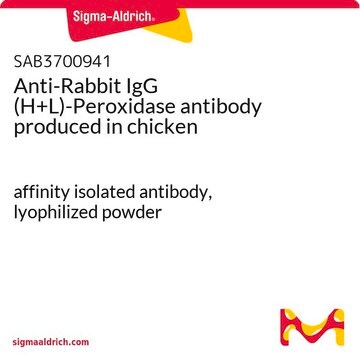SAB3700852
Anti-Rabbit IgG (Fc specific)-Peroxidase antibody produced in goat
affinity isolated antibody, lyophilized powder
Synonym(s):
HRP
Sign Into View Organizational & Contract Pricing
All Photos(1)
About This Item
UNSPSC Code:
12352203
NACRES:
NA.46
Recommended Products
biological source
goat
conjugate
peroxidase conjugate
antibody form
affinity isolated antibody
antibody product type
secondary antibodies
clone
polyclonal
form
lyophilized powder
species reactivity
rabbit
technique(s)
immunohistochemistry: suitable
indirect ELISA: suitable
western blot: suitable
shipped in
wet ice
storage temp.
2-8°C
target post-translational modification
unmodified
General description
Immunoglobulin G (IgG) contains two heavy chains and two light chains linked by disulfide bonds. It is divided into four classes namely, IgG1, IgG2, IgG3, and IgG4 with different heavy chains, named γ1, γ2, γ3, and γ4, respectively. Limited digestion using papain cleaves the antibody into three fragments, two of which are identical and contain the antigen-binding activity. The third fragment does not possess antigen-binding activity and is known as fragment crystallizable (Fc). It interacts with cells and effector molecules. The Fc fragment contains the CH2 and CH3 domains of the antibody molecule.Maternal IgG is the only antibody transported across the placenta to the fetus. It passively immunizes the infants.
Immunoglobulin G (IgG) contains two identical heavy chains and two identical light chains with molecular weight of 50kDa and 25kDa, respectively. Disulfide bonds are involved in linking the two heavy chains, linking the heavy and light chains and resides inside the chains. IgG is further subdivided into four classes namely, IgG1, IgG2, IgG3, and IgG4 with different heavy chains, named γ1, γ2, γ3, and γ4, respectively. Limited digestion using papain cleaves the antibody into three fragments, two of which are identical and contain the antigen-binding activity. The third fragment does not possess antigen-binding activity and is known as fragment crystallizable (Fc). It interacts with cells and effector molecules. The Fc fragment contains the CH2 and CH3 domains of the antibody molecule. Maternal IgG is the only antibody transported across the placenta to the fetus. It passively immunizes the infants.
Specificity
This product was prepared from monospecific antiserum by immunoaffinity chromatography using Rabbit IgG coupled to agarose beads. Assay by immunoelectrophoresis resulted in a single precipitin arc against Anti-Peroxidase, Anti-Goat Serum, Rabbit IgG, Rabbit IgG F(c) and Rabbit Serum. No reaction was observed against Rabbit IgG F(ab′)2
Immunogen
Rabbit IgG F(c) fragment
Physical properties
Antibody format: IgG
Physical form
Supplied in 0.02 M Potassium Phosphate, 0.15 M Sodium Chloride, pH 7.2 with 10 mg/mL Bovine Serum Albumin (BSA) - Immunoglobulin and Protease free
Reconstitution
Reconstitute with 1.0 mL deionized water (or equivalent).
Disclaimer
Unless otherwise stated in our catalog or other company documentation accompanying the product(s), our products are intended for research use only and are not to be used for any other purpose, which includes but is not limited to, unauthorized commercial uses, in vitro diagnostic uses, ex vivo or in vivo therapeutic uses or any type of consumption or application to humans or animals.
Not finding the right product?
Try our Product Selector Tool.
Certificates of Analysis (COA)
Search for Certificates of Analysis (COA) by entering the products Lot/Batch Number. Lot and Batch Numbers can be found on a product’s label following the words ‘Lot’ or ‘Batch’.
Already Own This Product?
Find documentation for the products that you have recently purchased in the Document Library.
Maria N Balatskaya et al.
Membranes, 11(3) (2021-04-04)
The membrane of platelets contains at least one uncharacterized glycosylphosphatidylinositol (GPI)-anchored protein according to the literature. Moreover, there is not enough knowledge on the receptor of low-density lipoproteins (LDL) mediating rapid Ca2+ signaling in platelets. Coincidentally, expression of a GPI-anchored
Paola Orlandi et al.
Biochemical pharmacology, 219, 115952-115952 (2023-12-01)
The aim of our study is to investigate in vitro and in vivo MC4R as a novel target in melanoma using the selective antagonist ML00253764 (ML) alone and in combination with vemurafenib, a B-rafV600E inhibitor. The human melanoma B-raf mutated
Yo Han Jang et al.
PloS one, 8(10), e75043-e75043 (2013-10-08)
Live attenuated vaccine (LAV), mimicking natural infection, provides an excellent protection against microbial infection. The development of LAV, however, still remains highly empirical and the rational design of clinically useful LAV is scarcely available. Apoptosis and caspase activation are general
Ye Zhang et al.
Experimental and therapeutic medicine, 18(1), 475-482 (2019-07-02)
MicroRNAs (miRNAs) are small non-coding RNAs that serve pivotal roles in human diseases. Several miRNAs, such as miR-485-3p, have been identified as potential biomarkers for predicting overall survival of patients with glioblastoma (GBM). However, the underlying mechanism of miRNAs in
Yan Ding et al.
Oncology letters, 15(6), 9339-9346 (2018-05-29)
The present study examined whether bufalin could induce human esophageal carcinoma ECA109 cells apoptosis via inhibiting the activation of mechanistic target of rapamycin (mTOR)/p70 S6 kinase (p70S6K) pathway is discussed in this article. The present study used the esophageal squamous
Our team of scientists has experience in all areas of research including Life Science, Material Science, Chemical Synthesis, Chromatography, Analytical and many others.
Contact Technical Service









